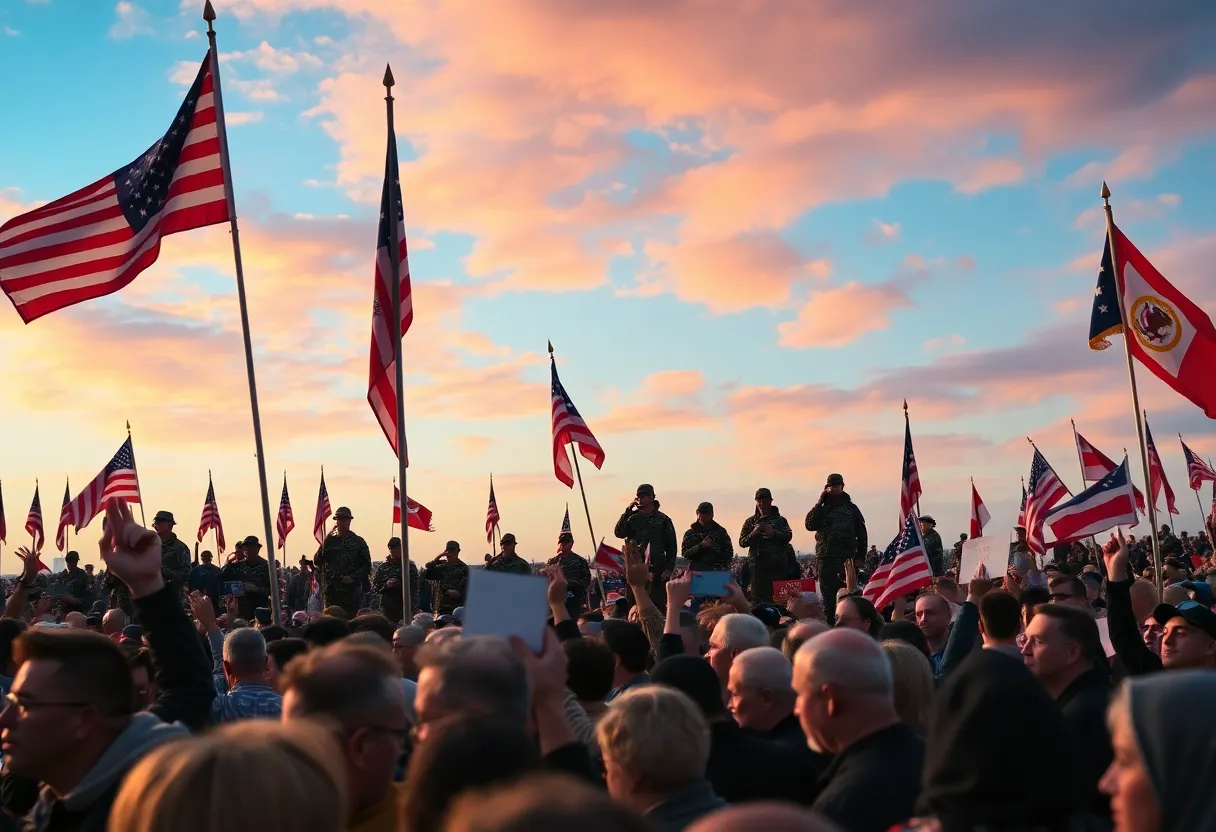News Summary
Donald Trump’s recent address at Fort Bragg has ignited debates over the intertwining of military and political affairs. His combative remarks included plans for a military parade and claims about the 2020 election being ‘rigged.’ While some troops responded positively, concerns over politicization and misleading statements have emerged, prompting discussions about military neutrality amidst civil unrest and migration issues. As reactions unfold, the implications of merging politics with military dynamics continue to fuel national dialogue.
Trump’s Controversial Speech at Fort Bragg Sparking Conversations
In a recent and rather combative address at Fort Bragg, North Carolina, Donald Trump has attracted both attention and criticism for intertwining politics with military affairs. Known for his passionate style, the ex-president’s speech was particularly notable as it came just a day after he ordered active-duty Marines to Los Angeles amidst civil unrest surrounding his immigration policies.
Plans for a Grand Military Parade
Adding to the spectacle, Trump revealed his ambition to oversee a military parade on his birthday, a move that’s sure to grab headlines. While previous presidents have used such occasions to honor military history and valor, Trump chose a different route, using the platform to aim barbs at what he described as “radical left lunatics” and throwing threats at protesters. This shift has generated dialogue on whether such politicization is appropriate, especially in a military context.
The 2020 Election Claims and Controversial Assertions
As if to drive home his contentious stance, Trump made false claims about the 2020 election being “rigged,” a statement that’s left many scratching their heads. Coupled with this, he expressed intentions to reverse a Biden administration decision to rename military bases that honor Confederate officers, a potential move that reignites long-standing debates about race and history in the military.
Polarizing the Military: Trump’s Unique Approach
Troops at Fort Bragg reacted positively to some of his statements, yet they also reflected a broader trend where Trump is seen as straying from the military’s traditional stance of nonpartisanship. His inclination to remove diverse senior military officers from key positions appears to have raised eyebrows and sparked conversations about the future of inclusivity within the armed forces. Furthermore, his attempts to reinstate former service members who were discharged for not taking Covid vaccinations invite further questions about how he views military discipline and public health measures.
The Militarization Amid Civil Unrest
Trump’s actions are part of a noticeable shift toward militarization, particularly in response to civil unrest. By deploying troops to the U.S.-Mexico border and encouraging applause from soldiers while criticizing political opponents, he further blends military engagement with partisan politics. This approach contrasts sharply with a historical norm, where political and military leaders usually strive to keep the military out of partisan disputes.
Misleading Statements and Misinformation
The speech also contained an array of misleading statements. For instance, Trump claimed credit for sending the National Guard to Minneapolis, ignoring that state officials had already taken action prior to his involvement. He exaggerated his administration’s success in defeating ISIS, asserting that it was done within mere weeks—a far cry from the complex reality of military engagements.
Recruitment Numbers and Immigration Issues
On the subject of military recruitment, Trump indicated it was “dire” under the Biden administration, despite evidence showing recent increases in enlistment figures. He also made sweeping and unverified claims regarding migrants, suggesting that foreign criminals were being sent to the U.S. to cross the border, which adds another layer of complexity to an already heated debate.
A Challenging Dialogue Ahead
Trump’s remarks about the California wildfires—a misstatement about their relationship to water usage restrictions—further highlight the ongoing narrative that seems to connect his rhetoric to a consistent pattern of politicizing military actions and shaping public perception through questionable assertions.
As the dust settles on the Fort Bragg speech, discussions are ramping up about what these actions mean for the military’s future neutrality and how they reflect broader national divides. While his supporters cheer, others are left pondering the implications of merging military affairs with partisan politics, questioning whether this is a healthier path for America’s armed forces.
Deeper Dive: News & Info About This Topic
- Military.com: Bragg Soldiers Who Cheered Trump’s Political Attacks
- Google Search: Trump’s Controversial Speech at Fort Bragg
- New York Times: Trump Wants the Military to Be More Like Trump
- Encyclopedia Britannica: Trump’s Speech at Fort Bragg
- CNN: Fort Bragg Troops and Trump’s Lies
- Google News: Trump Fort Bragg Militarization

Author: STAFF HERE PETERSBURG WRITER
The ST PETERSBURG STAFF WRITER represents the experienced team at HEREStPetersburg.com, your go-to source for actionable local news and information in St Petersburg, Pinellas County, and beyond. Specializing in "news you can use," we cover essential topics like product reviews for personal and business needs, local business directories, politics, real estate trends, neighborhood insights, and state news affecting the area—with deep expertise drawn from years of dedicated reporting and strong community input, including local press releases and business updates. We deliver top reporting on high-value events such as Grand Prix of St. Petersburg, Localtopia, and SHINE Mural Festival. Our coverage extends to key organizations like the St. Petersburg Area Chamber of Commerce and St. Pete Downtown Partnership, plus leading businesses in finance, manufacturing, and healthcare that power the local economy such as Raymond James Financial, Jabil, and Bayfront Health St. Petersburg. As part of the broader HERE network, including HEREJacksonville.com, HEREOrlando.com, HERETallahassee.com, and HERETampa.com, we provide comprehensive, credible insights into Florida's dynamic landscape.




